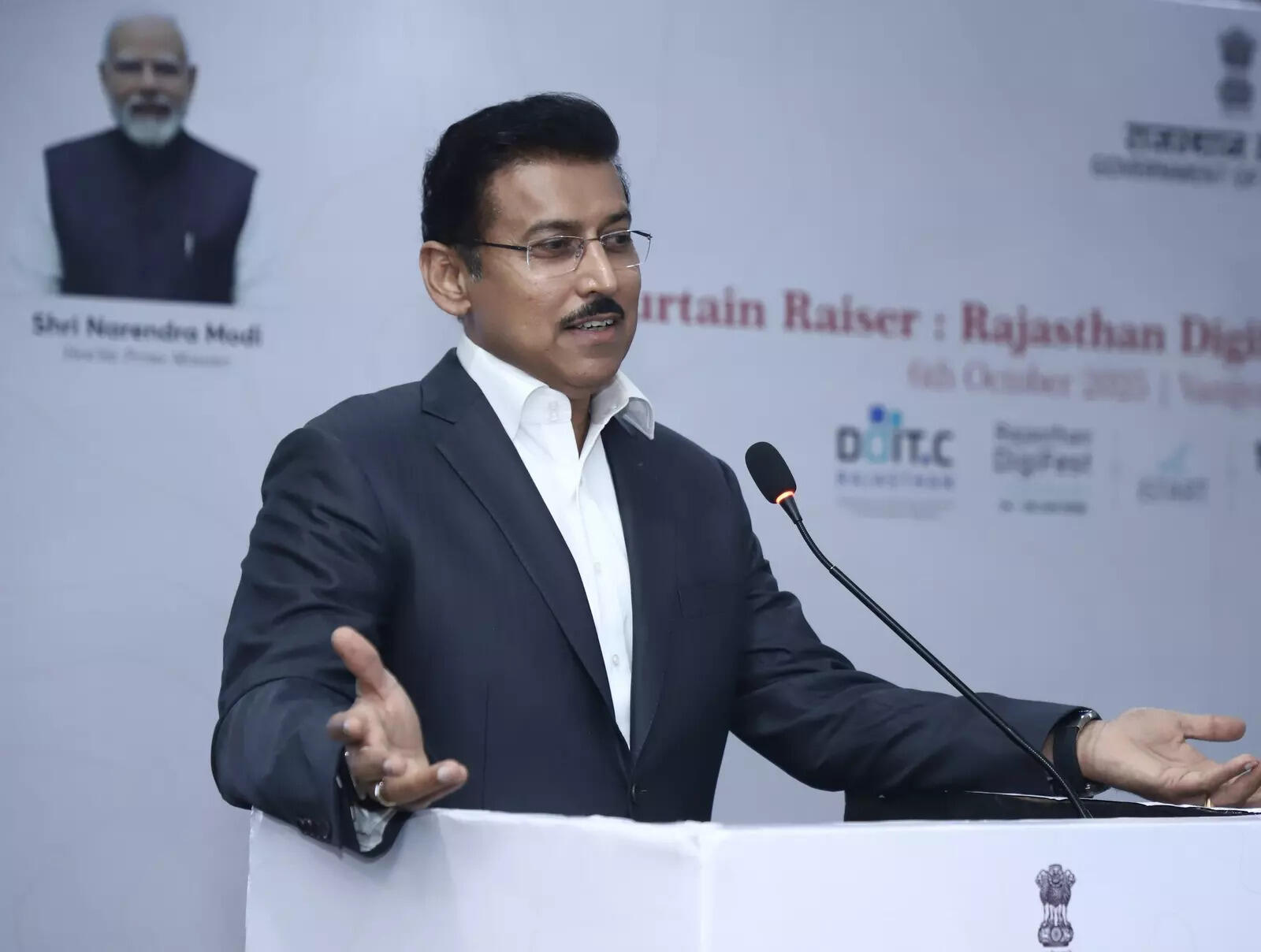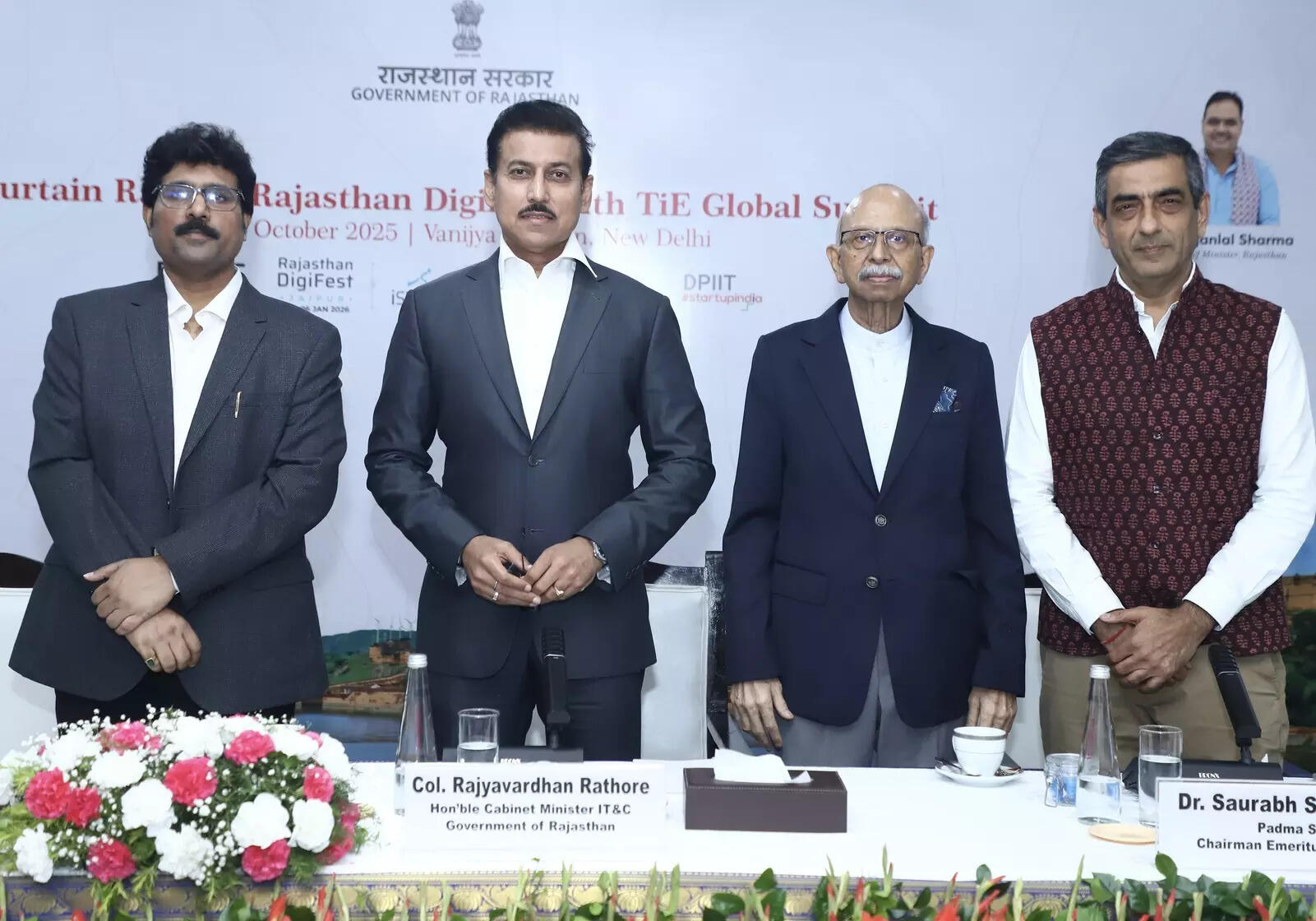
As Rajasthan accelerates its transformation into one of India’s dynamic investment destinations, the state’s focus on technology, renewable energy, logistics, and entrepreneurship is redefining its industrial landscape.
Leading this transformation is Col. Rajyavardhan Singh Rathore, Minister for Industry & Commerce, Youth Affairs & Sports Department, Government of Rajasthan — a decorated soldier, Olympian, and visionary policymaker. His ministry is driving policies to attract investors, nurture startups and create a robust industrial and digital ecosystem.
On the sidelines of the curtain raiser for the Rajasthan DigiFest in association with TiE Global Summit 2026, held in New Delhi on October 6, Anoop Verma spoke with Col. Rathore about Rajasthan’s evolving role as a hub for innovation and investment. The Minister shared insights into the state’s plan to develop a world-class IT city, expand data centre infrastructure, scale renewable energy capacity to 100 gigawatts, and foster a vibrant startup ecosystem built on sustainability, inclusion, and technological excellence.
Edited excerpts:
In your address at the Curtain Raiser, you mentioned the government’s plan to develop a major IT city in western Rajasthan. Could you elaborate on this plan?
The idea of developing an IT city has been formally announced in our state budget. Rajasthan has immense geographical and infrastructural advantages that make it suitable for such a greenfield project. We have the land, the connectivity, and—most importantly—the foresight to build an ecosystem that will serve the state and the nation for the next 30 to 50 years.
Most IT hubs in India have come up in the last decade, and they often suffer from space and infrastructure constraints. In contrast, we can plan afresh and create an integrated ecosystem where multiple IT-related companies—software development, data analytics, AI research, and electronics design—can co-exist and collaborate. We want to make Rajasthan a magnet for such enterprises.
Our approach is not based on short-term gains like land monetisation but on creating long-term value through industrial clusters. Being close to Delhi, having world-class road and rail connectivity, an international airport in Jaipur, and a peaceful, resourceful environment—all of these make Rajasthan an ideal destination for the next big IT city.
What specific kind of IT development are you targeting—GCCs, R&D centres, or software development hubs?
It will be a mix of all. We are building an ecosystem that can support everything from Global Capability Centres (GCCs) to AI-based research and development. We already have a Data Centre Policy in place, and our GCC Policy and AI Policy will be announced very soon. These policies are designed to provide clarity and confidence to investors about how to set up and grow in Rajasthan.
Additionally, under Rajasthan Investment Promotion Scheme (RIPS) 2024, we offer significant incentives and even customised benefits to companies that establish operations in the state. Through platforms like The Economic Times Government, we hope to spread awareness of these opportunities among global and domestic investors alike.
The Rising Rajasthan Summit saw MoUs worth about ₹35 lakh crore being signed across sectors. About ₹4 lakh crore of these MoUs are in the process of being implemented. Have IT and technology companies been part of this investment flow?
Many of the MoUs involve IT and allied sectors, though I may not have the exact figures at hand. What is encouraging is that several of these projects have already moved into the implementation phase. Some of the entrepreneurs who participated in the investment summits are from Rajasthan itself, and they are investing back into their home state.
Data centres are emerging as one of the fastest-growing segments in India. What steps are you taking to promote this sector in Rajasthan?

We are moving proactively in this direction. As I mentioned, we already have a Data Centre Policy in place, and Rajasthan is home to one of the most modern government-owned data centres in India. It has excellent capacity and infrastructure.
We are now inviting private players to establish their own data centres. Rajasthan offers a unique combination—vast tracts of affordable land, abundant renewable energy, and a stable environment—which allows for the creation of green data centres. These can operate sustainably, drawing power from solar and wind energy. It’s a win-win situation—for investors, for the environment, and for Rajasthan’s digital future.
Logistics is another area where Rajasthan seems to have a natural advantage, given the upcoming industrial corridors. How do you see this shaping the state’s industrial growth?
Logistics is indeed one of Rajasthan’s greatest strengths. When investors decide where to set up a facility, connectivity and supply chains are among the top considerations. Rajasthan scores highly on all counts.
We have the second-largest rail network in India and the second-largest network of national highways. Over 500 kilometres of the Dedicated Freight Corridor pass through the state, linking Delhi and Mumbai—the two biggest economic hubs in the country. This connectivity ensures seamless transportation of goods and raw materials.
Besides, Rajasthan offers a peaceful working environment, a skilled workforce, and an unmatched quality of life. It’s a beautiful, culturally rich state where one can work and unwind in the same place.
Rajasthan is also a national leader in renewable energy. How are you integrating solar and wind power into the broader industrial strategy?
Renewable energy is central to our industrial vision. Earlier, industries were allowed to develop up to 100% of their energy needs through captive renewable projects. We have now raised that cap to 200%, so they can generate surplus power and use it efficiently.
We are also encouraging industries to earn carbon credits by switching to green energy sources. Currently, Rajasthan’s renewable capacity stands at around 25–30 gigawatts, and our goal is to reach 100 gigawatts in the coming years. Large areas of land are being converted into solar and wind energy zones, creating synergies between our energy goals and industrial expansion.
This integration of renewable energy not only helps industries reduce costs and emissions but also strengthens Rajasthan’s image as a sustainable, forward-looking investment destination.
Startups play a critical role in innovation and job creation. How is Rajasthan nurturing its startup ecosystem?
Startups are vital because they bring new ideas, create jobs, and attract young talent. We are working actively to support them at every level.
Under our I-Start Rajasthan flagship program, we already have around 6,800 registered startups. Some of these have even achieved unicorn status. They are spread across diverse sectors—medtech, agri-tech, fintech, cleantech, and more.
The state government has invested around ₹1,000 crore in supporting startups through various initiatives. We offer direct land allotment to MSMEs and startups at concessional rates through a lottery system—not auctions—so that prices remain fair and predictable. Companies that employ local talent also receive benefits such as reimbursement of EPF contributions.
We are creating a full ecosystem of mentorship, funding, and market access. The upcoming TiE Global Summit in January 2026, to be held alongside the Digital Rajasthan Festival, will further showcase Rajasthan as a dynamic hub for startups and innovation.
What is your larger vision for Rajasthan’s industrial future over the next two decades?
Our vision is to make Rajasthan the most attractive destination for investors and innovators—not just in India but globally. We want to create a self-sustaining industrial ecosystem where policies are predictable, governance is transparent, and infrastructure is world-class.
With our emphasis on renewable energy, IT, logistics, and startups, we are positioning Rajasthan as the engine of growth for northern and western India. When entrepreneurs and investors think about where to set up their next venture, I want their first thought to be—Rajasthan is the place to be.

